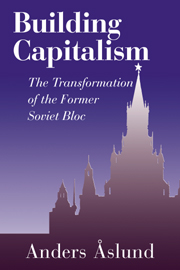Book contents
- Frontmatter
- Contents
- List of Tables and Charts
- Acknowledgments
- List of Abbreviations
- Introduction
- 1 What Communism Actually Was
- 2 The Decline and Fall of Socialism
- 3 Strategic Policy Choices
- 4 Changes in Output and Their Causes
- 5 Liberalization
- 6 Financial Stabilization
- 7 Privatization
- 8 Social Developments and Policy
- 9 State and Politics in the Transformation
- 10 Role of the Outside World
- 11 Conclusions
- Bibliography
- Index
5 - Liberalization
Published online by Cambridge University Press: 15 September 2009
- Frontmatter
- Contents
- List of Tables and Charts
- Acknowledgments
- List of Abbreviations
- Introduction
- 1 What Communism Actually Was
- 2 The Decline and Fall of Socialism
- 3 Strategic Policy Choices
- 4 Changes in Output and Their Causes
- 5 Liberalization
- 6 Financial Stabilization
- 7 Privatization
- 8 Social Developments and Policy
- 9 State and Politics in the Transformation
- 10 Role of the Outside World
- 11 Conclusions
- Bibliography
- Index
Summary
Freedom of trade, prices, and enterprise is the essence of a market economy, while stable prices prevailed also in centrally planned economies. Private enterprise had dominated in the planned Nazi economy, and in the orthodox communist German Democratic Republic the private sector comprised over one-third of the urban economy until 1972 (Åslund 1985). In contrast, any partially deregulated socialist market economy has been unstable and functioned poorly.
The quintessence of liberalization was to move from a shortage of goods and services to a scarcity of money, which is the predicament of capitalism. It involved a switch from a sellers' market to a buyers' market, and a transfer of economic power from producers to consumers. We have already seen that the liberalization of prices and foreign trade are the most forceful structural reforms. Because economic freedom is the foundation of a market economy, we shall discuss liberalization before macroeconomic stabilization and privatization.
Although deregulation appears the most important group of systemic reforms, it has received little scholarly attention. One reason is the paucity of relevant economic indicators, such as the degree of shortage, regional price dispersion, relative prices, product quality, and market structure. Economists had to create their own data sets, rendering empirical work arduous, but that was also true of privatization, which aroused innumerable enterprise surveys.
Another reason was that market-oriented economists tended to look upon liberalization as something simple, done quickly and requiring little afterthought. Initially, liberal politicians and economists harbored an excessive belief in the spontaneous formation of markets, reckoning that it was enough to eliminate central planning, to destroy the administrative command system, and to introduce private property (Akaev 2000, p. 39).
- Type
- Chapter
- Information
- Building CapitalismThe Transformation of the Former Soviet Bloc, pp. 159 - 196Publisher: Cambridge University PressPrint publication year: 2001



